Fleurs du Mal Magazine


Or see the index
Joni Mitchell: New Critical Readings recognizes the importance and innovativeness of the musician and artist Joni Mitchell and the need for a collection that theorizes her work as musician, composer, cultural commentator and antagonist.
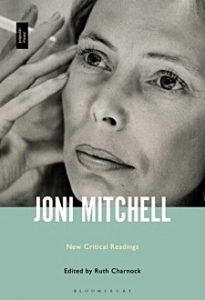 It showcases pieces by established and early career academics from the fields of popular music and literary studies on subjects such as Mitchell’s guitar technique, the politics of aging in her work, and her fractious relationship with feminism.
It showcases pieces by established and early career academics from the fields of popular music and literary studies on subjects such as Mitchell’s guitar technique, the politics of aging in her work, and her fractious relationship with feminism.
The collection features close readings of specific songs, albums, and performances while also paying keen attention to Mitchell’s wider cultural contributions and significance.
About the Author: Ruth Charnock is Senior Lecturer in English at the University of Lincoln, UK. She is the author of Anaïs Nin: Bad Sex, Shame and Contemporary Culture (forthcoming, 2019) and various articles and essays on Joni Mitchell, Marvin Gaye, Anaïs Nin, contemporary American literature, and popular culture.
Joni Mitchell
New Critical Readings
Editor: Ruth Charnock
Published: 24-01-2019
Format: Hardback
Edition: 1st
248 pages
Illustrations: 2 bw illus
Dimensions: 229 x 152 mm
Publisher: Bloomsbury Academic
Language: English
ISBN-10: 1501332090
ISBN-13: 978-1501332098
£86.40
# new books
joni mitchell
new critical readings
• fleursdumal.nl magazine
More in: - Book News, - Bookstores, Archive C-D, Archive M-N, Archive M-N, Art & Literature News, Joni Mitchell
Quelle force de vérité accorder à la poésie? Apparemment aucune selon Baudelaire.
 C’est pourtant lui qui assure le passage décisif vers une poésie qui remet en question ses fondements, son devenir, sa nécessité, une poésie qui exige d’être sans cesse perception à valeur existentielle.
C’est pourtant lui qui assure le passage décisif vers une poésie qui remet en question ses fondements, son devenir, sa nécessité, une poésie qui exige d’être sans cesse perception à valeur existentielle.
La réflexivité poétique qui s’exerce entre apparence et tréfonds de l’homme exacerbe le poétique et le menace. Où, quand, comment et vers quoi se joue le vrai du poème ?
Pourquoi cette oeuvre pose-t-elle les enjeux de la modernité ?
Se débattant contre tout Idéal absolu, la poétique baudelairienne désire la liberté incarnée et douloureuse de l’artiste, de l’humain.
Régine Foloppe, est l’auteur de plusieurs recueils poétiques, notamment : Tributaires du vent (Le Castor Astral, prix Max-Pol Fouchet) et Famines (Belin). Elle a publié des articles et des poèmes dans des revues (PO&SIE, Eidôlon, Friches, Diérèse…). Agrégée de lettres modernes, docteure en littérature française, elle enseigne à l’Université de Montpellier.
Baudelaire et la vérité poétique
Auteur: Régine Foloppe
Editeur : Editions L’Harmattan
Collection : La philosophie en commun
19 février 2019
Format : 15,5 x 24 cm
Broché
464 pages
Langue : Français
ISBN-10: 2343157642
ISBN-13: 978-2343157641
EUR 42,00
• fleursdumal.nl magazine
More in: - Book News, - Bookstores, Archive A-B, Archive A-B, Archive E-F, Art & Literature News, Baudelaire, Baudelaire, Charles
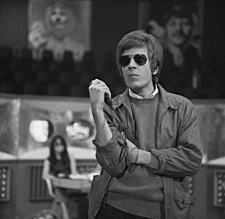
Tilt
Bij de muziek van Scott Walker
I
Slagschaduw van hand met potlood
over de ontcijfering van wat hier klinkt:
links en rechts brandbaar geheimen rollen
in elkaar tot wat een steekspel wordt.
Hij
daar met die neiging, veraf en zo dichtbij
zoals ik hier nu jou reeds weet,
beweegt zich buigend en verlangend
zinvol tasten in. Op zoek naar evenwicht.
II
Deze kluizenaar vermoedt onder kousen sproetjes.
Bezweert binnensmonds nachtmerries en
helt zoals hij denkt in cirkelend
weerkaatsen – luidop maar ongezien,
liefst.
Cimbalen laat hij klateren als water.
Toch hangt van dit geluid zijn leven amper af.
O the Luzerner Zeitung never sold out,
never sold out
III
Over zinnen laat hij zilvergrijze sluiers vallen.
Niemand vraagt waarom. Zo is het dan ook goed.
Zingen is voor deze stem geen afdoend woord:
plofjes adem blijven hangen tussen microfoon en
oren.
Dan zweeft hij tussen fluisteren en fluiten door
op weg naar waterweegbree, webben en de lippen
van een meisje dat met open mond probeert
een mooie ronde o te neuriën
IV
Wereldvreemde man schept eigen logica.
Wie die niet volgen kan mag heel gewoon
een straatje om. Zie je hem dan de pijn niet lijden
van monsters in de nacht, van schaduwen in
regen?
De monnik wist verhalen uit, tegels almaar donkerder
rond de voeten. Hoofdvol galmen wonderen.
In geval van dij, in geval van dij. Hij kust gaten
voor de kogels in geval van dij.
V
Zie hoe het zeil spant. Onder de verse huif
telt hij de rimpels in zijn handen, met die
van zijn vader vol overeenkomsten, net
als de verse verdragen voor toekomst.
Nat
de lakzegel nog. Krullend van heimwee
naar een tijd van jagers stort hij zich
een aanval binnen. Vurig smeedt hij daarin
gulle plannen. Vurig.
Bert Bevers
Verschenen in Gierik & Nieuw Vlaams Tijdschrift, Antwerpen, 1998
In memoriam Scott Walker (born Noel Scott Engel; January 9, 1943 – March 22, 2019)
Photo: Scott Walker – Dutch TV programme Fenklup 1968 – Beeld en Geluid Wiki
• fleursdumal.nl magazine
More in: Archive A-B, Archive W-X, Art & Literature News, Bevers, Bert, In Memoriam, Scott Walker
De Nasleep
Als dat schôon menske weer lillek is geworden.
Als oe bed zich niet onder oe kont bevindt.
Als het daglicht die hossende Rotterdammer verraadt,
Dan rest alleen nog maar de kater,
maar is uw Carnaval waarschijnlijk geslaagd.
De Kater…
Zou het licht alsjeblieft wat minder hard willen praten?
Ik kan mijn hoofdpijn niet zo goed meer verstaan..
Onias Landveld
 Onias Landveld (Paramaribo, 1985) is een verhalenverteller. Hij schrijft, spreekt, dicht en inspireert. Vanaf aug 2017 is hij voor twee jaar de stadsdichter van Tilburg.
Onias Landveld (Paramaribo, 1985) is een verhalenverteller. Hij schrijft, spreekt, dicht en inspireert. Vanaf aug 2017 is hij voor twee jaar de stadsdichter van Tilburg.
Zijn talent deelt hij graag via concepten, workshops en spreek-cursussen. Maar het podium is waar hij het liefst staat. In 1989 ontvluchtte hij samen met zijn familie de Surinaamse burgeroorlog. Na 3 jaar te hebben gewoond in Utrecht, vertrok het gezin weer naar zijn geboorteland. Sinds 1998 woont hij in Tilburg.
Na jaren te hebben rondgedwaald ontdekte hij zijn liefde voor het gesproken woord. In 2015 mocht hij daarvoor de Van Dale Spoken Award voor storytelling ontvangen.
Het heeft hem nog meer gemotiveerd om naar mensen uit te reiken. Altijd zoekende om iemand te raken met een memorabele boodschap, blijft hij met woorden banden smeden. Hij houdt daarvan. Herkenning creëren door een zaadje te planten, gevoed met passie en identificatie.
• fleursdumal.nl magazine
More in: *Concrete + Visual Poetry K-O, Archive K-L, Archive K-L, City Poets / Stadsdichters, Landveld, Onias
Onias Landveld Stadsdichter van Tilburg organiseert op 30 maart, de tweede editie van The Stage. Die avond zal hij met zijn podium te gast zijn bij het Tilt Festival in Theater De Nieuwe Vorst in Tilburg.
 Het thema van de avond is “Zij is”, een knik naar de Boekenweek 2019, die ‘Moeder de vrouw’ als onderwerp heeft.
Het thema van de avond is “Zij is”, een knik naar de Boekenweek 2019, die ‘Moeder de vrouw’ als onderwerp heeft.
Met een aantal speciale gasten zal The Stage bezoekers die avond vermaken met poëzie, verhalen en muziek.
De stadsdichter is het podium gestart omdat hij iets wil achterlaten als hij in Augustus dit jaar afzwaait.
Onias Landveld vindt dat woordkunst in een stad als Tilburg een plaats moet blijven hebben. Daarom is hij vorig jaar dit evenement gestart dat zijn vaste plek in de Nwe Vorst heeft.
Op 30 maart staan on Stage: Zeinab El Bouni, Aminata Cairo, LouLou Elisabettie, Lev Avitan, Whitney Muanza Sabina Lukovic en Tessa Gabriëls.
Onias Landveld & The Stage
Tilt Festival in Theater De Nieuwe Vorst
Willem II straat – Tilburg.
Aanvang: 20:45
Einde: 22:45
Kaarten verkrijgbaar via de website van Tilt of de Nieuwe Vorst
# website theater de nieuwe vorst

• fleursdumal.nl magazine
More in: *Concrete + Visual Poetry K-O, - Book Lovers, Archive K-L, Archive K-L, Art & Literature News, City Poets / Stadsdichters, Landveld, Onias, STREET POETRY, THEATRE, Tilt Festival Tilburg
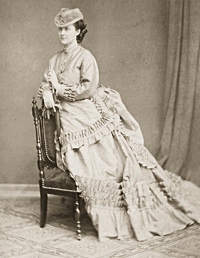
Von Liebe
Am Abend sprach das Meer und flüsterte:
Ihr schönen Mägdelein, erzählt mir leise,
Ich will die Liebe wissen! Redet mir
So von der Liebe, gleich als sollte ich
Dran sterben, so als müsst’ in Ruhe ich
Versinken dran, als könnte sie vorm Sturme
Mich schützen, dass so wütend er nicht mehr
Auf mich sich stürzte! – O! so sprachen da
Die Mägdelein, – Wir wissen wahrlich nicht,
Du armes Meer, ob wir erzählen dürfen;
Denn nimmermehr würdst du in wilder Kraft
Die Schiffe schleudern wollen, und der Felsen
Sorgenumwölbte Stirn mit Schaume peitschen,
Noch wälzen unter jähe, grüne Klippen
Der Sterne Blicken. Glaub’ uns Meer, Du wolltest
So mächtig nimmer sein, so scheu und spröde,
In deinen Schoß und in dein Herz nicht mehr
Die schlafumfangnen Menschenherzen saugen.
Du würdest dann gleich uns den Himmel ansehn,
Und ihn nicht sehen, lächeln, wie der Wind
Vorüberweht, und weinen, weil die Sonne
Aufgeht! Nein! wir werden nichts erzählen!
Carmen Sylva
(1843-1916)
Von Liebe
Gedicht
• fleursdumal.nl magazine
More in: Archive S-T, Archive S-T, CLASSIC POETRY
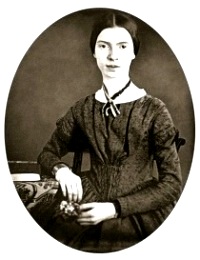
A Day
I’ll tell you how the sun rose, —
A ribbon at a time.
The steeples swam in amethyst,
The news like squirrels ran.
The hills untied their bonnets,
The bobolinks begun.
Then I said softly to myself,
“That must have been the sun!”
But how he set, I know not.
There seemed a purple stile
Which little yellow boys and girls
Were climbing all the while
Till when they reached the other side,
A dominie in gray
Put gently up the evening bars,
And led the flock away.
Emily Dickinson
(1830-1886)
A Day
• fleursdumal.nl magazine
More in: Archive C-D, Dickinson, Emily
De 84ste editie van de Boekenweek vindt plaats van zaterdag 23 maart tot en met zondag 31 maart en heeft De moeder de vrouw als thema naar het gelijknamige gedicht van Martinus Nijhoff.
 Voor de Boekenweek 2019 schreef Jan Siebelink het Boekenweekgeschenk Jas van belofte, dat tijdens de Boekenweek bij besteding van ten minste €12,50 aan Nederlandstalige boeken door de boekhandel cadeau wordt gedaan.
Voor de Boekenweek 2019 schreef Jan Siebelink het Boekenweekgeschenk Jas van belofte, dat tijdens de Boekenweek bij besteding van ten minste €12,50 aan Nederlandstalige boeken door de boekhandel cadeau wordt gedaan.
Het Boekenweekessay is geschreven door Murat Isik en heeft de titel Mijn moeders strijd. Tijdens de Boekenweek is het voor € 3,75 verkrijgbaar in de boekwinkel.
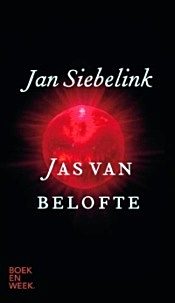 Op 31 maart, de laatste zondag van de Boekenweek, kunnen reizigers traditiegetrouw op het vertoon van het Boekenweekgeschenk gratis met de trein reizen.
Op 31 maart, de laatste zondag van de Boekenweek, kunnen reizigers traditiegetrouw op het vertoon van het Boekenweekgeschenk gratis met de trein reizen.
De moeder de vrouw
Het thema van de Boekenweek 2019 is ontleend aan het beroemde gedicht van Martinus Nijhoff ‘De moeder de vrouw’. Tevens is het Boekenweekthema een verwijzing naar de bundel De moeder de vrouw, met daarin twee romans (Ontaarde moeders en Mijn zoon heeft een seksleven en ik lees mijn moeder Roodkapje voor) over moederschap van de onlangs overleden Renate Dorrestein.
# meer informatie op website boekenweek
Boekweek 2019
van 23 – 31 maart
• fleursdumal.nl magazine
More in: - Book Lovers, - Book News, - Book Stories, - Bookstores, Art & Literature News, Boekenweek, Jan Siebelink, Nijhoff, Martinus
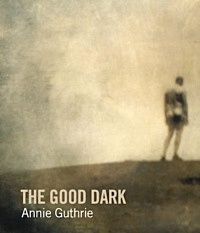 In the sequence of poems comprising Annie Guthrie’s first book, the quest for the meaning of human consciousness and its tangled subjectivity is drawn as a slow-building narrative of the mystic experience.
In the sequence of poems comprising Annie Guthrie’s first book, the quest for the meaning of human consciousness and its tangled subjectivity is drawn as a slow-building narrative of the mystic experience.
The journey enacted is that of the self as character, who encounters insurmountable mysteries in a breaking selfhood.
A dossier of contemplative exploration, THE GOOD DARK chronicles an immersive search in three acts: Unwitting, Chorus, and Body: stations through which the character must pass, and where she is accumulatively confessed, compounded and erased.
the gossip
I don’t always want what we have, she is saying.
Outside, dark clouds, fish hopping, tilling waves
back from shore. He is silent.
Sometimes more is happening, he says, finally.
The sun’s coming up, she says. Look how the light is kept.
I’d like to keep it up, he says.
Don’t make apart when otherwise the same, he says.
She is silent, tilling shore back from shore.
Don’t give darkness a face, he says, darkening.
Annie Guthrie is a writer and jeweler living in Tucson. She has a metalsmithing studio at Splinter Brothers Warehouse and can be found through her website, www.annieguthrie.net. She teaches at the University of Arizona Poetry Center and also mentors select students wishing to apprentice in poetry or to further their art projects through her courses in “Oracular Writing.”
The Good Dark
by Annie Guthrie
Paperback: 68 pages
Publisher: Tupelo Press, Inc.
2015
Language: English
ISBN-10: 1936797593
ISBN-13: 978-1936797592
Categories: Poetry
$16.95
# more poetry
The Good Dark
by Annie Guthrie
• fleursdumal.nl magazine
More in: - Bookstores, Archive G-H, Archive G-H, Art & Literature News
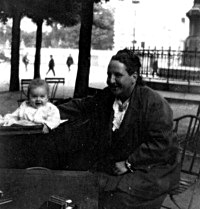
Mrs. Whitehead
But you like it.
They can’t any of them be quite as bad because they learned french but I never did.
He doesn’t look dead at all.
The wind might have blown him.
He comes from that direction. That’s the way.
They are not knotted. Have you smelt it. What would you suggest, your advice I have come across three or four.
So they are the others.
Separate them.
It does make one come, he is extraordinarily charming and endearing once of twice only twice I think.
He is not staying out that’s hard beside that what does he do.
That’s long for his mother.
She travelled from this rest. She crocheted from this nest.
She crocheted from this nest. I thought it wasn’t ever.
It’s one of my favorite ones this.
And yet not this.
Isn’t it funny.
It isn’t.
Break or breaking, very fair, break or very wanting.
I tried it this way before.
Very difficult to change extra places and yet I can agree. I can agree by that. I rest this piece of it and it’s nearly the same climate. I will tell you why they want a real door. They choose it.
They do so and very pure water. They are safe when they take a bath. Oh it is very. Oh it is.
In a way a vest.
I do think you get what you want.
Corrections.
It is eleven weeks from the middle of September. I glance in a way.
It is eleven weeks from the middle of September.
Total recollect others.
I glance at and I can recollect others. I make a division neatly, I close.
What is wrong with not blue. That is right with apples. Apples four. For. Fore.
Before that.
Next stretching.
Next for that leaf stretching.
I do not state leaf.
I like to beg very much stream.
Not exactly in state.
Understate.
All in so.
They expect all the blues to take of all the other families, the whites are extra they are beside all that, they make a little house and through and beside that they live in Paris.
Hardly enough for wood.
Not a color even.
By now a change of grass and wedding rings and all but the rest plan. I don’t care I won’t look.
I am not sure that yellow is good. I am tall.
Allow that. I don’t want any more out in conversation.
I can be careful.
Not within wearing it.
I cannot say to stay.
No please don’t get up.
And now that.
Yes I see.
Did you pay him for that whether for a spider and such splendor and indeed quitting. I meant to gather.
I see it I see it.
Please ocean spoke please Helen land please take it away.
I saw a spoken leave leaf and flowers made vegetables and foliage in soil. I saw representative mistakes and glass cups, I saw a whole appearance of respectable refugees, I did not ask actors I asked pearls, I did not choose to ask trains, I was satisfied with celebrated ransoms. I cannot deny Bertie Henschel is coming tomorrow. Saturdays are even. There is a regular principle, if you mention it you mention what happened.
What do you make of it.
You exceed all hope and all praise.
Stein, Gertrude
(1874-1946)
Mrs. Whitehead
fleursdumal.nl magazine
More in: Archive S-T, Archive S-T, Gertrude Stein, Stein, Gertrude
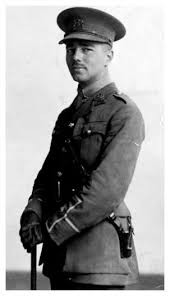
Anthem for Doomed Youth
What passing-bells for these who die as cattle?
— Only the monstrous anger of the guns.
Only the stuttering rifles’ rapid rattle
Can patter out their hasty orisons.
No mockeries now for them; no prayers nor bells;
Nor any voice of mourning save the choirs,—
The shrill, demented choirs of wailing shells;
And bugles calling for them from sad shires.
What candles may be held to speed them all?
Not in the hands of boys, but in their eyes
Shall shine the holy glimmers of goodbyes.
The pallor of girls’ brows shall be their pall;
Their flowers the tenderness of patient minds,
And each slow dusk a drawing-down of blinds.
Wilfred Owen
(1893 – 1918)
Anthem for Doomed Youth (Poem)
• fleursdumal.nl magazine
More in: Archive O-P, Archive O-P, Galerie des Morts, Owen, Wilfred, WAR & PEACE

Guerre civile
La foule était tragique et terrible ; on criait :
À mort ! Autour d’un homme altier, point inquiet,
Grave, et qui paraissait lui-même inexorable,
Le peuple se pressait : À mort le misérable !
Et lui, semblait trouver toute simple la mort.
La partie est perdue, on n’est pas le plus fort,
On meurt, soit. Au milieu de la foule accourue,
Les vainqueurs le traînaient de chez lui dans la rue.
— À mort l’homme ! — On l’avait saisi dans son logis ;
Ses vêtements étaient de carnage rougis ;
Cet homme était de ceux qui font l’aveugle guerre
Des rois contre le peuple, et ne distinguent guère
Scévola de Brutus, ni Barbès de Blanqui ;
Il avait tout le jour tué n’importe qui ;
Incapable de craindre, incapable d’absoudre,
Il marchait, laissant voir ses mains noires de poudre ;
Une femme le prit au collet : « À genoux !
C’est un sergent de ville. Il a tiré sur nous !
— C’est vrai, dit l’homme. — À bas ! à mort ! qu’on le fusille !
Dit le peuple. — Ici ! Non ! Plus loin ! À la Bastille !
À l’arsenal ! Allons ! Viens ! Marche ! — Où vous voudrez »,
Dit le prisonnier. Tous, hagards, les rangs serrés,
Chargèrent leurs fusils. « Mort au sergent de ville !
Tuons-le comme un loup ! — Et l’homme dit, tranquille :
— C’est bien, je suis le loup, mais vous êtes les chiens.
— Il nous insulte ! À mort ! » Les pâles citoyens
Croisaient leurs poings crispés sur le captif farouche ;
L’ombre était sur son front et le fiel dans sa bouche ;
Cent voix criaient : « À mort ! À bas ! Plus d’empereur ! »
On voyait dans ses yeux un reste de fureur
Remuer vaguement comme une hydre échouée ;
Il marchait poursuivi par l’énorme huée,
Et, calme, il enjambait, plein d’un superbe ennui,
Des cadavres gisants, peut-être faits par lui.
Le peuple est effrayant lorsqu’il devient tempête ;
L’homme sous plus d’affronts levait plus haut la tête ;
Il était plus que pris, il était envahi.
Dieu ! comme il haïssait ! comme il était haï !
Comme il les eût, vainqueur, fusillés tous ! « Qu’il meure !
Il nous criblait encor de balles tout à l’heure !
À bas cet espion, ce traître, ce maudit !
À mort ! c’est un brigand ! » Soudain on entendit
Une petite voix qui disait : « C’est mon père ! »
Et quelque chose fit l’effet d’une lumière.
Un enfant apparut. Un enfant de six ans.
Ses deux bras se dressaient suppliants, menaçants.
Tous criaient : « Fusillez le mouchard ! Qu’on l’assomme ! »
Et l’enfant se jeta dans les jambes de l’homme,
Et dit, ayant au front le rayon baptismal :
« Père, je ne veux pas qu’on te fasse de mal ! »
Et cet enfant sortait de la même demeure.
Les clameurs grossissaient : « À bas l’homme ! Qu’il meure !
À bas ! finissons-en avec cet assassin !
Mort ! » Au loin le canon répondait au tocsin.
Toute la rue était pleine d’hommes sinistres.
À bas les rois ! À bas les prêtres, les ministres,
Les mouchards ! Tuons tout ! c’est un tas de bandits ! »
Et l’enfant leur cria : « Mais puisque je vous dis
Que c’est mon père ! — Il est joli, dit une femme,
Bel enfant ! » On voyait dans ses yeux bleus une âme ;
Il était tout en pleurs, pâle, point mal vêtu.
Une autre femme dit : « Petit, quel âge as-tu ?
Et l’enfant répondit : — Ne tuez pas mon père ! »
Quelques regards pensifs étaient fixés à terre,
Les poings ne tenaient plus l’homme si durement.
Un de plus furieux, entre tous inclément,
Dit à l’enfant : « Va-t’en ! — Où ? — Chez toi. — Pourquoi faire ?
— Chez ta mère. — Sa mère est morte, dit le père.
— Il n’a donc plus que vous ? — Qu’est-ce que cela fait ? »
Dit le vaincu. Stoïque et calme, il réchauffait
Les deux petites mains dans sa rude poitrine,
Et disait à l’enfant : « Tu sais bien, Catherine ?
— Notre voisine ? — Oui. Va chez elle. — Avec toi ?
— J’irai plus tard. — Sans toi je ne veux pas. — Pourquoi ?
— Parce qu’on te ferait du mal. » Alors le père
Parla tout bas au chef de cette sombre guerre :
« Lâchez-moi le collet. Prenez-moi par la main,
Doucement. Je vais dire à l’enfant : À demain !
Vous me fusillerez au détour de la rue,
Ailleurs, où vous voudrez. — Et, d’une voix bourrue :
— Soit, dit le chef, lâchant le captif à moitié.
Le père dit : — Tu vois. C’est de bonne amitié.
Je me promène avec ces messieurs. Sois bien sage,
Rentre. » Et l’enfant tendit au père son visage,
Et s’en alla content, rassuré, sans effroi.
« Nous sommes à notre aise à présent, tuez-moi,
Dit le père aux vainqueurs ; où voulez-vous que j’aille ? »
Alors, dans cette foule où grondait la bataille,
On entendit passer un immense frisson,
Et le peuple cria : « Rentre dans ta maison ! »
Victor Hugo
(1802-1885)
Guerre civile
(Poème)
La Légende des siècles, 1877
• fleursdumal.nl magazine
More in: Archive G-H, Archive G-H, Hugo, Victor, Victor Hugo
Thank you for reading Fleurs du Mal - magazine for art & literature